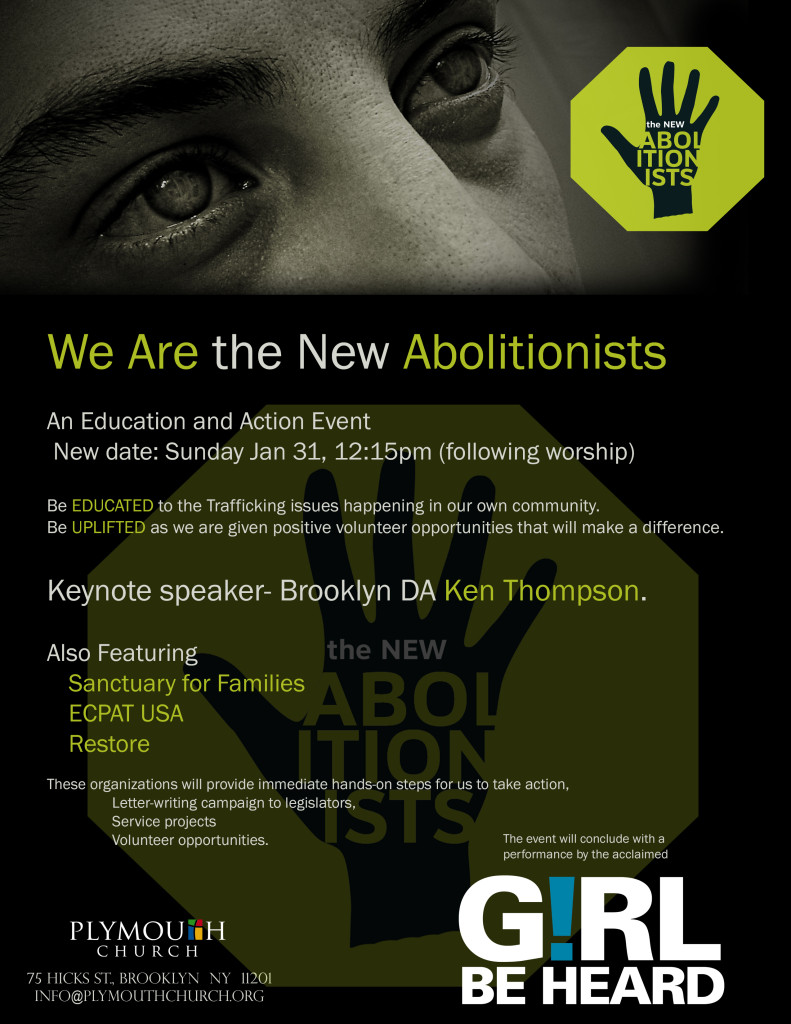Abolitionist
[ab-uh-lish-uh-nist]
noun
1. (especially prior to the Civil War) a person who advocated or supported the abolition of slavery in the U.S.
I’m a member of Plymouth Church in Brooklyn Heights. After “church shopping” I joined Plymouth because of its stand on social justice issues. Plymouth is proud of its history. Founded in 1854, the congregation called as its first minister Henry Ward Beecher. They gave the famed abolitionist, brother of Harriet Beecher Stowe, a platform – literally – to speak on.
In those turbulent years leading up to the Civil War and through the Emancipation Proclamation Plymouth would be packed on Sundays with close to 3,000 people, come to hear Beecher preach against slavery. Famous anti-slavery advocates spoke at Plymouth, including William Lloyd Garrison, Sojourner Truth, and Frederick Douglass. Plymouth held deep philosophical connections with the Underground Railroad — the secretive network of people who helped slaves escape to the North and Canada. Documentary evidence lends support to the belief that Plymouth was also a site of active participation, known as Brooklyn’s “Grand Central Depot.” Plymouth brought Abraham Lincoln to New York for his famous speech at Cooper Union, that launched Lincoln’s presidential campaign. Here, in Brooklyn Heights, is a place where people gathered who changed history, affecting the lives of millions.
But what benefit is this history?
Fours years ago Plymouth hosted a discussion on human trafficking. I went, hardly knowing what the term meant. Two years ago we revisited the topic. In partnership with the Brooklyn Historical Society we sponsored a round-table discussion moderated by now attorney general, Loretta Lynch. The more I educated myself on human trafficking – on modern day slavery – the more I unearthed facts, metrics, and numbers: There are more slaves in the world today than at the time of the Civil War. Slavery does not happen only overseas, but in the United States. Not just the United States, but all fifty states. In New York. In New York City. In Brooklyn. In my backyard.
The famous historian Marc Bloch, a Jew who joined the French resistance and was killed in Paris by the Gestapo, wrote that the purpose of history is to draw lines of connection from the present to the past, to better understand the impact of our actions, today. Historian George Santayana famously wrote “Those who do not remember the past are condemned to repeat it.”
So how accurate is the definition of abolitionist (above)? Is being an abolitionist, working to abolish slavery, a thing of the past? No. Too much work needs to be done. The New York State Anti-Trafficking Coalition launched a campaign in 2013, New York’s New Abolitionists, to raise awareness around human trafficking and modern-day slavery. It’s a brilliant campaign, drawing lines of connection from abolitionists past to abolitionists working hard to end slavery today: doctors, lawyers, survivors, people from every walk of life. What I’ve learned is that we can all be new abolitionists. Let us not be condemned to repeat history, but to effect change, today.
I invite you to come to Plymouth this Sunday: listen to Brooklyn DA Ken Thompson, meet and speak with folks from Restore, ECPAT-USA (End Child Prostitution and Trafficking) and Sanctuary for Families. See and hear the testimony of trafficking survivors given by the activist teen theater group Girl Be Heard. If you already know the story of human trafficking in New York City, come to learn what you can do to to end trafficking. And if you already volunteer, come to meet us, other like-minded folks. Join the crowd. Be an abolitionist. A new abolitionist. Because We Are the New Abolitionists. No one else. Us.
Beth Fleisher, chair
We Are the New Abolitionists
The Anti-trafficking Ministry of
Plymouth Church, Brooklyn
